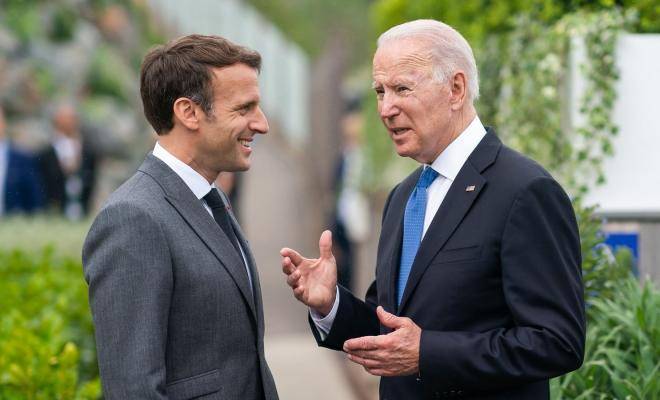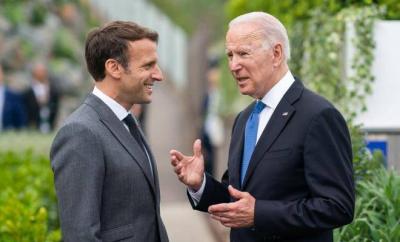As Beirut holds its breath amidst the fiery violence of war along the southern front, attention turns to the Paris summit between French President Emmanuel Macron and U.S. President Joe Biden on June 8. Reports indicate that Lebanon (the southern war and presidential vacancy) will be on the agenda alongside Ukraine, Gaza, and other topics, propelled by the Elysee, which is fighting to preserve its remaining historical role in Lebanon after its influence has waned in various regions, as stated by "Al-Rai" in Kuwait.
It is no longer a secret that French presidential envoy Jean-Yves Le Drian's visit to Beirut last week (his sixth in the context of assisting in breaking the presidential deadlock in Lebanon) aimed at preparing a report containing conclusions for the Macron-Biden summit. This was similar to the purpose of the 40-minute call that Parliament Speaker Nabih Berri received from U.S. envoy Amos Hochstein regarding arrangements for the day after the war in southern Lebanon.
Despite France volunteering to collaborate with the United States in drafting a framework agreement regarding the future of southern Lebanon once the guns fall silent between Israel and Hezbollah, its primary focus remains on political Lebanon. Le Drian has suggested that it might cease to exist if the hijacked presidency remains unliberated from its vacancy soon, an interest that Macron initiated following the horrific "Hiroshima-like" explosion at the Port of Beirut nearly four years ago, launching initiative after initiative without any significant results.
Despite claims regarding Le Drian's recent visit and the "lack of results" that emerged from efforts to bridge the gap between Lebanese political forces to facilitate presidential elections, it is evident that international, regional, and even local dynamics have failed to unravel the pending issue confined behind closed doors, which the Shiite duo—Hezbollah and President Berri—holds the lock and key to within the context of the struggle for power balance and Lebanon's regional position.
Notably, the ongoing presidential vacancy for approximately 18 months has sparked intense activity with minimal results, as if this activity aims to create a standoff over the presidency, given the difficulty in disengaging from it due to the impasse enforced by the Shiite duo behind their sole candidate, Sleiman Frangieh, who has become a code name for the battle for control over key positions in the country, similar to the strategic command in general.
From the long journeys of ambassadors from five countries (the United States, France, Saudi Arabia, Egypt, and Qatar) to the recent movement initiated by the Democratic Gathering, led by Taymour Joumblatt (towards Lebanese Forces leader Samir Geagea and Free Patriotic Movement head Gibran Bassil), to the parallel roles of France at times and Qatar at others, along with internal initiatives like those undertaken by the National Moderation Bloc, all appear to be efforts to keep the presidential elections—currently in a prolonged coma—in the intensive care unit, ensuring a minimum balance of internal stability and achieving some degree of regional balance until the appointed hour for the next president, according to "Al-Rai" in Kuwait.




